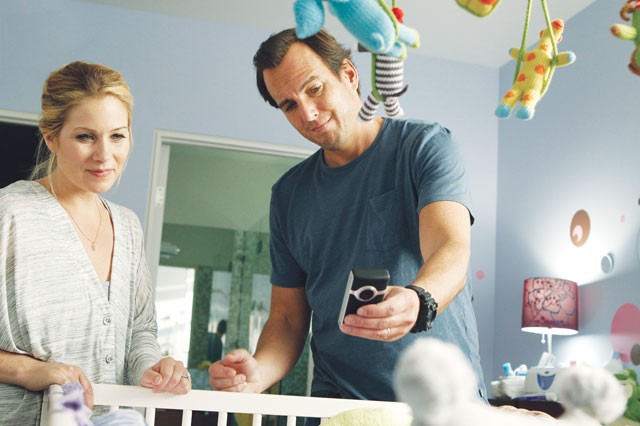Suburgatory (7:30pm Wed, ABC)
Suburgatory runs roughshod through the suburbs, laying waste to the malls and manicured lawns. This new satire stars Jane Levy as Tessa, a Greenwich Village wild child whose dad moves her to suburban hell for a supposedly more wholesome life. Levy looks like a young Julia Roberts with Roberts’ way with a deadpan wisecrack. Her character is our tour guide through this strange new world of nose jobs and lacquered hair, narrating with city-girl sarcasm.
Tessa can’t believe her dad (Jeremy Sisto) expects her to be happy among the plastic people. And she just sneers when he unveils their new suburban accoutrements with an enthusiastic “ta-da!”
“'Ta-da’ is what you say when something good happens.”
Suburgatory gets every potpourri-scented detail right, but its scorn never turns toxic. The filmmakers avoid condescension by giving Tessa a heart under her smug superiority. As a result, Suburgatory is the rare sitcom that crushes its subject while displaying a certain amount of affection for it.
Up All Night (7pm Wed, NBC)
Up All Night takes an age-old sitcom premise — a clueless couple not ready for parenthood — and makes it feel fresh and contemporary. In this new series, Chris (Will Arnett) is an overgrown kid who stays home to raise the baby, Reagan (Christina Applegate) a former party girl who goes back to her old job. If Arnett and Applegate aren’t enough comic masters for you, add in Maya Rudolph as Reagan’s self-involved boss. With exquisite subtlety, these three nail the ridiculousness of their oh-so-modern narcissism.
Their victim, hilariously, is the baby. Chris and Reagan try to make themselves understood while the baby struggles against a diaper change, enunciating every word as if speaking to an unruly foreigner who doesn’t quite understand English: “WE. ARE. TRYING. TO. HELP. YOU. WE. ARE. ON. YOUR. SIDE.”
NBC, I’m going to be very upset if you cancel Up All Night (as Fox did with Arnett’s similarly sophisticated Running Wilde last season) without giving it a fair chance. Please treat this baby better than Chris and Reagan treat theirs.
How to Be a Gentleman (7:30pm Thu, CBS)
Andrew (David Hornsby) is a fussy journalist who sees himself as the Last of the Gentlemen in this new sitcom. He dresses in blazers, opens doors for old ladies, and uses the word “whom.” Andrew befriends Bert (Kevin Dillon), an obnoxious slob who represents his polar opposite. “You know everything about bein’ a gentleman, but nothin’ about bein’ a man!” Bert bellows. Cue laugh track.
Given that The Odd Couple already covered this premise, and much better, I don’t know who will tune in. Or whom.
Prime Suspect (9pm Thu, NBC)
Maria Bello will probably grow tired of being compared to Helen Mirren in this new American remake of the beloved British crime series. But you can’t help it: Mirren gave an unforgettable performance as homicide detective Jane Tennison, while Bello is eminently forgettable as the new Jane, who deals with cartoonish sexism from colleagues on the Manhattan force. Bellow lacks Mirren’s gravitas, flashing a 100-watt smile that seems more appropriate for a sitcom than a gritty drama. Her jaunty fedora doesn’t help, nor does her constant gum chewing.
I hate to say it, but I think Helen Mirren could even chew gum better than that.
Prohibition (8pm Sun-Tue, PBS)
Documentarian Ken Burns has found another big subject that allows him to zoom in and out of black-and-white photographs from his favorite era, the 19th and early 20th centuries. Prohibition displays all the Burns affections we’ve come to know from The Civil War, Jazz, and Baseball: the melancholy music played on old-timey instruments, the earnest narration, and the overly detailed approach that finally wears you out. But I guess you can’t really blame Ken Burns for making a Ken Burns documentary.
Prohibition is an ambitious work that attempts nothing less than a history of American alcohol consumption. Burns starts in the early 1800s, when easily available whiskey turned a nation of drinkers into a nation of problem drinkers. On his way to 1920s Prohibition, he explains dissolute saloon culture and the sometimes over-the-top attempts to curb it. We hear of such colorful reformers as Carrie Nation, whose unsubtle approach to temperance involved busting up saloons with a hatchet. Her motto: “Smash, smash, smash.”


